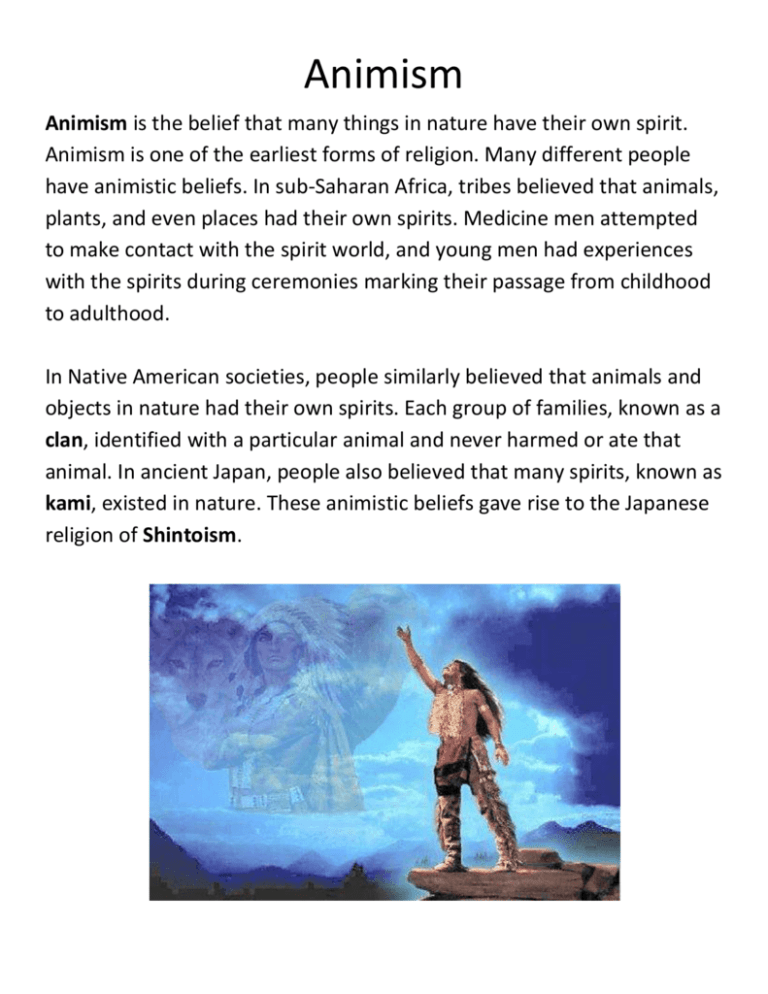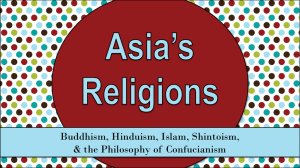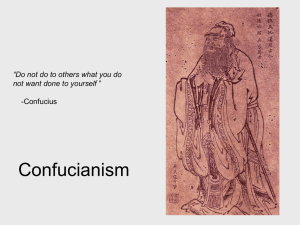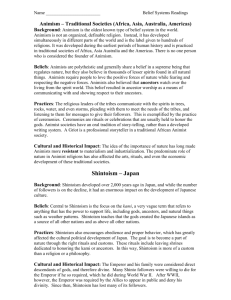Animism - Images
advertisement

Animism Animism is the belief that many things in nature have their own spirit. Animism is one of the earliest forms of religion. Many different people have animistic beliefs. In sub-Saharan Africa, tribes believed that animals, plants, and even places had their own spirits. Medicine men attempted to make contact with the spirit world, and young men had experiences with the spirits during ceremonies marking their passage from childhood to adulthood. In Native American societies, people similarly believed that animals and objects in nature had their own spirits. Each group of families, known as a clan, identified with a particular animal and never harmed or ate that animal. In ancient Japan, people also believed that many spirits, known as kami, existed in nature. These animistic beliefs gave rise to the Japanese religion of Shintoism. Hinduism Like animism, Hinduism is a very ancient religion. It teaches its disciplines that the principles of life can be discovered through meditation. Hinduism has no single holy book, but Hindu writings like the Upanishads and the Bhagavad-Gita provide guidance and inspiration. Many Hindus believe that God is revealed through the ancient land and principles contained in Hindu scriptures, which speak of a struggle between order and chaos. Hinduism is the third largest religion in the world, and the most popular religion in modern India and Nepal. There are about one billion Hindus in the world today. Buddhism Buddhism began in Nepal 500 B.C. Prince Siddhartha Gautama lived a life of great luxury. One day, he looked out beyond his palace walls and was shocked by the human suffering he saw all around him. This prompted him to leave his family and to set out in search of truth. After six years of searching, he came to believe suffering was caused by human desire. Gautama became known as “Buddha.” He taught that to end suffering, a person must come to accept the world as it is and to block out selfish desires. Buddhist missionaries carried his ideas throughout India and China, Korea and Japan. Today, Buddhism remains popular in East and Southeast Asia. Judaism In the Middle East, three religions arose, linked by their belief in a single god, known as monotheism. From the Middle East, these monotheistic religions later spread to Europe, Africa, Asia, and the Americas The oldest of these, Judaism, was the first religion known to assert the existence of one god. The Jewish religion emerged to assert the existence of one god. The Jewish religion emerged 4,000 years ago in the area along the Mediterranean occupied by present day Israel, Lebanon, and Jordan. According to Jewish tradition, the ancient Hebrews migrated from Israel to Egypt to escape food shortages from drought. They remained in Egypt for hundreds of years, where they became enslaved by the Egyptians. Moses later led the Jews out of Egypt and back to Israel. According to the bible, as the Jewish people were leaving Egypt, Moses presented the Jewish people with the Ten Commandments, which he said came directly from God. Of the world’s 17 million Jews today, 40% live in Israel, and another 40% reside in the United States. Christianity Christianity began about 2,000 years ago. It is based on the teachings of Jesus, a Jew born in Bethlehem. Jesus preached forgiveness, mercy, and sympathy for the poor and the helpless. The Romans crucified Jesus for claiming he was the Messiah or Savior. After his death, a band of his followers, known as the Apostles, believed Jesus had risen from the dead to redeem mankind. This prompted his followers to spread the new Christian religion. Followers were attracted to the belief in an afterlife in which all believers, including the poor and humble, would be rewarded. Eventually, Christianity became the major religion of the Roman Empire. Later, Christians divided into Orthodox Christians, Catholics, and Protestants. The Pope is the head of the Catholic Church; Catholics believe he is God’s deputy on Earth. Orthodox Christians are mainly found in Greece and Russia. Protestants reject the Pope’s authority and believe that people should interpret the Bible for themselves. Today, Christianity is the principal religion in Europe and the Americas. Many Christians also live in Africa and Asia. With two billion followers, Christianity is the world’s most popular religion. Islam “Islam” means “submission” (to Allah) in Arabic. A follower of Islam is called a Muslim, or “one who submits (to God).” Islam was founded by Mohammed, around 600 A.D. Mohammed had a vision that commanded him to covert Arab tribes to the belief in a single God, known as “Allah” – the same God worshipped by Jews and Christians. Merchants grew jealous of Mohammed’s growing influence in Mecca, where he lived. Mohammed fled to Medina in 622, where he emerged as a major religious leader. His followers believed that Mohammed was God’s last and greatest prophet. His teachings are contained in the Qu’ran (Koran), Islam’s holiest book. The Five Pillars of Faith are the basic religious duties that all followers of Islam must fulfill. Over one billion people follow the Islamic faith today. About one-fifth of them live in Arabic-speaking countries. Pakistan, Bangladesh, and Indonesia are also Muslim nations. Sikhism Sikhs live mainly in Northern India. Sikhism combines both Hindu and Muslim beliefs. Like Hindus, Sikhs believe in reincarnation. Like Muslims, Sikhs believe in one God. Sikhs believe that God can be known through meditation (a form of deep contemplation). The goal of every Sikh is to build a close and loving relationship with God. Sikhs believe that everyone has equal status in the eyes of God. Therefore, unlike Hindus, Sikhs believe that everyone has equal status in the eyes of God. Therefore, unlike Hindus, Sikhs do not have castes- hereditary social classes. Sikh men do not cut their hair, which is often worn under a turban. Confucianism Confucianism is a way of life taught by Confucius in the 6th–5th century BC. Sometimes viewed as a philosophy, sometimes as a religion, Confucianism is perhaps best understood as an all-encompassing humanism that neither denies nor slights Heaven. Confucianism has been followed by the Chinese for more than two millennia. It has deeply influenced spiritual and political life in China; its influence has also extended to Korea, Japan, and Vietnam. East Asians may profess themselves to be Shintoists, Taoists, Buddhists, Muslims, or Christians - but seldom do they cease to be Confucians. Date founded: 6th-5th cent. BC Place founded: China Founder: Confucius (551-479 BC) Followers: 5-6 million Holy Text: Analects The main principle of Confucianism is ("humaneness" or "benevolence"), signifying excellent character in accord with ritual norms, loyalty to one's true nature, reciprocity, and filial piety. Together these constitute virtue. Confucianism is characterized by a highly optimistic view of human nature. The faith in the possibility of ordinary human beings to become aweinspiring sages and worthies is deeply rooted in the Confucian heritage (Confucius himself lived a rather ordinary life), and the insistence that human beings are teachable, improvable, and perfectible through personal and communal endeavor is typically Confucian. Confucius regarded Heaven as a positive and personal force in the universe; he was not, as some have supposed, an agnostic or a skeptic.









